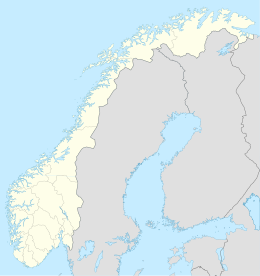Bragdøya

Bragdøya as seen from the west
|
|
|
Location of the island
|
|
| Geography | |
|---|---|
| Location | Vest-Agder, Norway |
| Coordinates | 58°07′04″N 8°00′05″E / 58.1178°N 08.0014°ECoordinates: 58°07′04″N 8°00′05″E / 58.1178°N 08.0014°E |
| Area | 0.7 km2 (0.27 sq mi) |
| Length | 1.5 km (0.93 mi) |
| Width | 600 m (2,000 ft) |
| Coastline | 5.3 km (3.29 mi) |
| Highest elevation | 35 m (115 ft) |
| Administration | |
|
Norway
|
|
| County | Vest-Agder |
| Municipality | Kristiansand |
| Demographics | |
| Population | 0 (2015) |
Bragdøya is an island in Kristiansand municipality in Vest-Agder county, Norway. The 0.7-square-kilometre (0.27 sq mi) island is in the archipelago in the Kristiansandsfjorden, just south of the city of Kristiansand. The island is surrounded by the smaller islands of Svensholmen and Langøya to the north (across the narrow Bragdøyrenna strait) and the island of Hestehaue to the southeast. The heavily populated island of Andøya lies to the southwest.
Bragdøya has been owned by the municipality of Kristiansand since 1969 when they bought it with a government grant as a public open space. It was purchased with the requirement that the islands would be a recreational space for the city. During the summer, the island is used as grazing land for sheep.
For centuries, Bragdøya has been inhabited. "Siffuord Bragdøen" is mentioned in written sources as owner from 1610 and onwards. The first manor house in Kristiansand was built in Bragdøya around 1770 for the family of Henrik Arnold Thaulow. Thaulow was the grandfather of Oscar Wergeland, Henrik Wergeland, and Camilla Collett, and his grandchildren spent time on the island during the summers. There are several older cottages on the island.
In 1915, two large warehouses were built on the west side of Bragdøya where mackerel was salted and packed for export. The business did not go particularly well, however, and in the interwar period the business was ended.
The Nazi German occupiers committed executions of at least 28 Soviet POWs on Bragdøya during World War II.
...
Wikipedia


